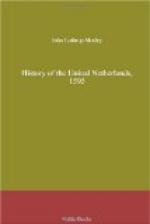But debates over a lost battle are apt to be barren. Meantime Fuentes, losing no time in controversy, advanced upon the city of Dourlens, was repulsed twice, and carried it on the third assault, exactly one week after the action just recounted. The Spaniards and Leaguers, howling “Remember Ham!” butchered without mercy the garrison and all the citizens, save a small number of prisoners likely to be lucrative. Six hundred of the townspeople and two thousand five hundred French soldiers were killed within a few hours. Well had Fuentes profited by the relationship and tuition of Alva!
The Count of Dinant and his brother De Ronsoy were both slain, and two or three hundred thousand florins were paid in ransom by those who escaped with life. The victims were all buried outside of the town in one vast trench, and the effluvia bred a fever which carried off most of the surviving inhabitants. Dourlens became for the time a desert.
Fuentes now received deputies with congratulations from the obedient provinces, especially from Hainault, Artois, and Lille. He was also strongly urged to attempt the immediate reduction of Cambray, to which end those envoys were empowered to offer contributions of four hundred and fifty thousand florins and a contingent of seven thousand infantry. Berlaymont, too, bishop of Tournay and archbishop of Cambray, was ready to advance forty thousand florins in the same cause.
Fuentes, in the highest possible spirits at his success, and having just been reinforced by Count Bucquoy with a fresh Walloon regiment of fifteen hundred foot and with eight hundred and fifty of the mutineers from Tirlemont and Chapelle, who were among the choicest of Spanish veterans, was not disposed to let the grass grow under his feet. Within four days after the sack of Dourlens he broke up his camp, and came before Cambray with an army of twelve thousand foot and nearly four thousand horse. But before narrating the further movements of the vigorous new governor-general, it is necessary to glance at the military operations in the eastern part of the Netherlands and upon the Rhine.
The States-General had reclaimed to their authority nearly all that important region lying beyond the Yssel—the solid Frisian bulwark of the republic—but there were certain points nearer the line where Upper and Nether Germany almost blend into one, which yet acknowledged the name of the king. The city of Groenlo, or Grol, not a place of much interest or importance in itself, but close to the frontier, and to that destined land of debate, the duchies of Cleves, Juliers, and Berg, still retained its Spanish garrison. On the 14th July Prince Maurice of Nassau came before the city with six thousand infantry, some companies of cavalry, and sixteen pieces of artillery. He made his approaches in form, and after a week’s operations he fired three volleys, according to his custom, and summoned the place to capitulate. Governor Jan van Stirum replied stoutly that he would hold the place for God and the king to the last drop of his blood. Meantime there was hope of help from the outside.




